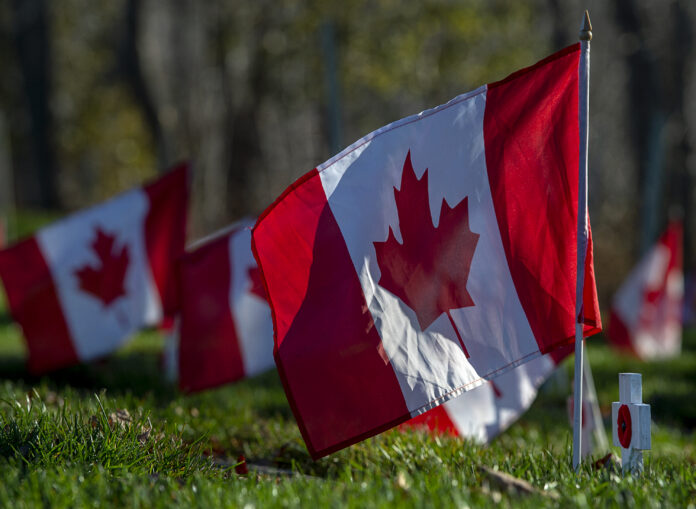For some Canadian veterans, the struggle to access vital support services can feel like it follows a predictable path.
“Deny, delay, die,” said Debbie Lowther, executive director of VETS Canada, a charity that helps veterans in crisis. “We hear it quite regularly.”
The stark stakes of the struggle to access care and support are once again in the spotlight amid outrage and calls for an inquiry into the case of a Veterans Affairs Canada (VAC) employee discussing medical assistance in dying with a veteran, as first reported by Global News on Aug. 16.
Sources told Global News a VAC service agent brought up medical assistance in dying, or MAID, unprompted in a conversation with the combat veteran, who was seeking treatment for post-traumatic stress disorder and a traumatic brain injury.
Global News is not identifying the veteran who was seeking treatment.
Multiple sources tell Global News the combat veteran never raised the issue, nor was he looking for MAID, and that he was deeply disturbed by the suggestion. Those sources and VAC have told Global News the discussion took place, and VAC confirmed it is investigating the incident.
Sources close to the veteran say he and his family were disgusted by the conversation, and feel betrayed by the department mandated to assist veterans. The sources said the veteran was seeking services to recover from injuries suffered in the line of duty, and had been experiencing positive improvements in his mental and physical health. They say the unprompted mention of MAID disrupted his progress and has been harmful to the veteran’s progress and his family’s well-being.
Lowther said she was “appalled” to hear of the incident, adding it raises serious concerns.
“If we have a veteran who’s already struggling with their mental health and maybe they are contemplating suicide … this is an opportunity that’s been presented to them.”
For some, the thought of taking their own life and having a loved one find their body may have been a deterrent to going through with suicidal thoughts, she explained.
But presenting the option to have a medically assisted death instead, Lowther said, “could have very, very damaging consequences.”
Struggling Canadian veteran offered medically assisted death by VAC employee
Under Canadian law, medically-assisted death can only be discussed between a primary care provider like a physician or psychiatrist and their patient.
The incident is raising questions about the training being given to VAC employees, with Conservatives now calling for an inquiry.
They want to know, among other concerns, whether similar suggestions have been made to other veterans — and whether any veterans may have acted on the suggestion and chosen to die.
“We don’t know whether this was a policy: whether written or unwritten or being communicated to people. So I’m calling on the government to commit to a full investigation,” said Frank Caputo, Conservative veterans’ affairs critic.
“We need to know how this happened. We also need to know, were there other veterans that were provided this option? Did any veterans take the government up on this? These are unanswered questions.”
Read more:
Veterans Affairs says worker ‘inappropriately’ discussed medically assisted death with veteran
Veterans Affairs Minister Lawrence MacAulay said in a statement on Monday that he has asked his deputy minister to “ensure this never happens again.”
An official, speaking on background, told Global News that case managers receive sensitivity and crisis training in case a veteran were to raise the subject of assisted death themselves, but that they are not qualified to offer or suggest the service.
Rachel Blaney, veterans critic for the NDP, called the incident a symptom of a “deeper wound” after successive slashes to funding for veterans services over the decades.
She pointed to a report by Auditor General Karen Hogan earlier this year which urged the government to commit to a “long-term resourcing plan” for Veterans Affairs Canada, which is not meeting its targets for delivering disability benefits to veterans in a timely manner.
The service standards for the department aim to address 80 per cent of cases seeking benefits within 16 weeks. Instead, the audit found the median wait time is 37 weeks for Canadian Forces veterans and 51 weeks for RCMP veterans.
That audit found Veterans Affairs Canada is only meeting its target 39 per cent of the time.
“It is a symptom of a much larger and longstanding problem, which is veterans not getting the support that they need when they need it,” Blaney said.
“We’re hearing from the veterans employees, the V.A., that they need more resources. They have been saying very clearly that a lot of vet caseworkers are leaving because they are overworked, they are burnt out, which means veterans are paying the price … we need to see that.”
– with a file from Global News’ Sean Boynton
If you or someone you know is experiencing mental health challenges, support is available on this Government of Canada website.
© 2022 Global News, a division of Corus Entertainment Inc.



